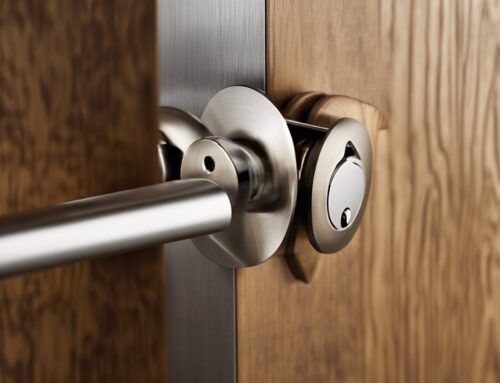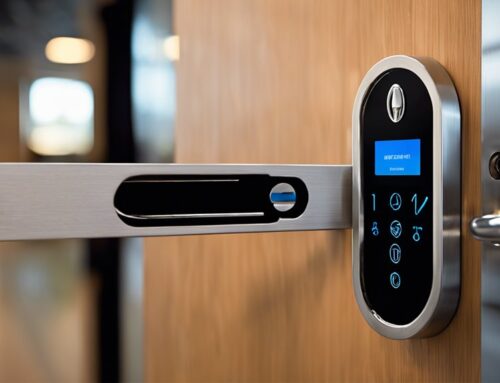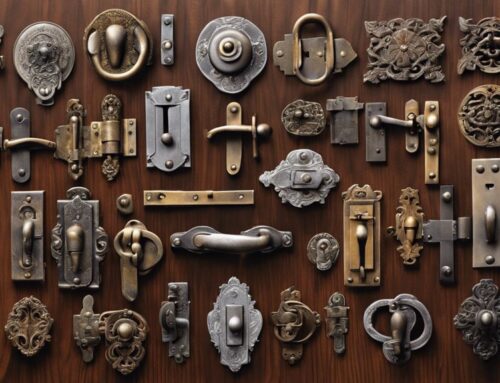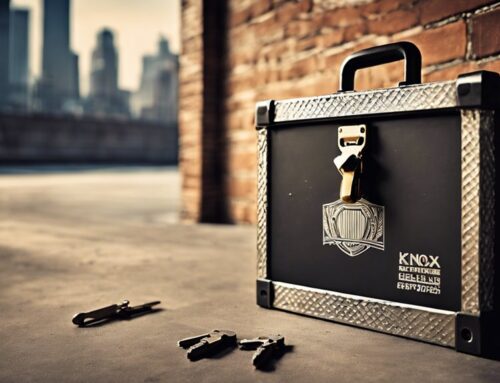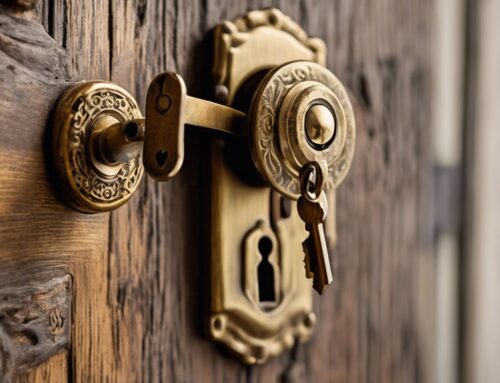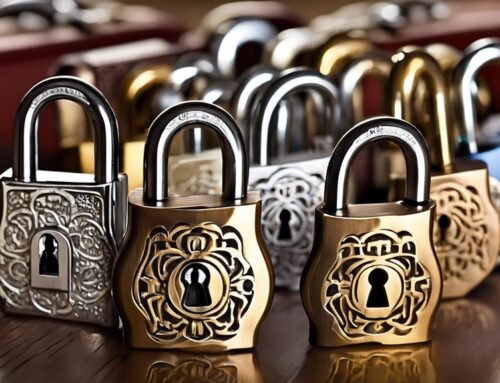Deadbolt locks are an essential element in home security, offering superior defense against forced entry. These locks utilize a solid metal bolt that secures deeply into the door jamb, providing greater protection compared to standard locks. There are various types, including single-cylinder, double-cylinder, and smart locks, each catering to different security needs. High-quality deadbolts with features like anti-drill protection greatly enhance security. Proper installation and regular maintenance are important to maximize their effectiveness. For a thorough understanding of how to select, install, and maintain the best deadbolt locks, further insights on their advantages and usage await you.
Introduction to Deadbolt Locks
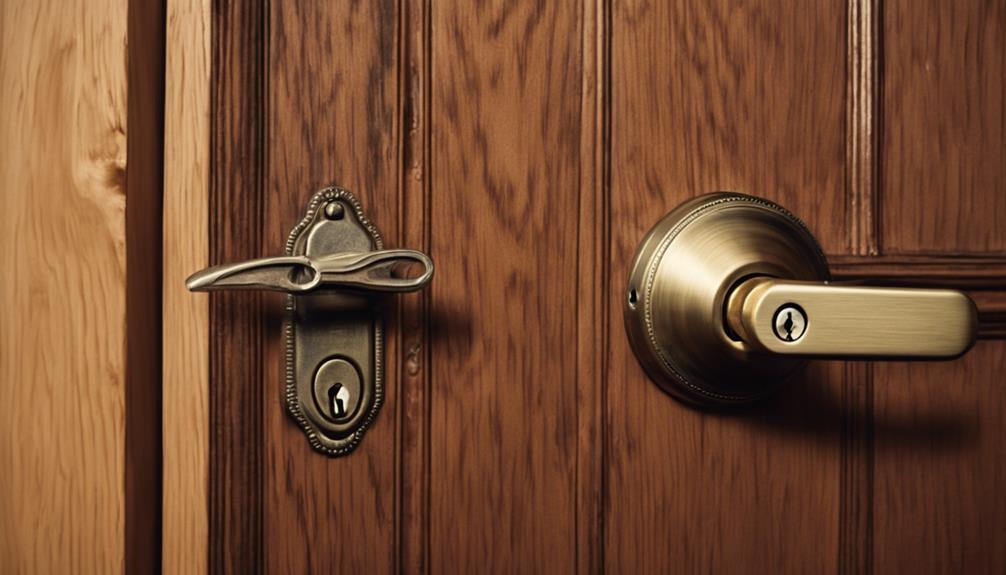
Deadbolt locks are essential security devices characterized by a solid metal bolt that offers enhanced protection against forced entry. Their importance is underscored by their widespread use in both residential and commercial properties, providing peace of mind to property owners. Understanding the history and evolution of deadbolt locks provides valuable insight into their development and the security advantages they offer today.
Definition and Importance
Providing a robust defense against unauthorized entry, deadbolt locks play an essential role in enhancing home security. These locks are distinguished by their solid metal bolt that slides into the door jamb, creating a reliable barrier against forced entry. Unlike standard locks, deadbolts offer superior protection, making them indispensable in both residential and commercial settings. Available in various types such as single-cylinder, double-cylinder, and smart locks, deadbolts cater to diverse security demands. For maximum effectiveness, investing in high-quality deadbolt locks with anti-drill features and hardened steel components is important. By choosing the right deadbolt, property owners can greatly bolster their security measures, ensuring peace of mind and safeguarding their assets.
History and Evolution
In response to the growing need for enhanced security, the invention of deadbolt locks in the early 20th century marked a significant advancement in the field of residential and commercial property protection. Over time, the evolution of deadbolts led to various types, including single-cylinder, double-cylinder, vertical, electronic, and smart locks. These innovations have established deadbolts as the standard choice for homeowners, prized for their high security, durability, and ease of installation. Continuous improvements in design and materials, such as anti-drill mechanisms and hardened steel components, have further fortified deadbolts against forced entry. The progression of deadbolt technology underscores a relentless commitment to safeguarding properties with unparalleled precision and strength.
Types of Deadbolt Locks
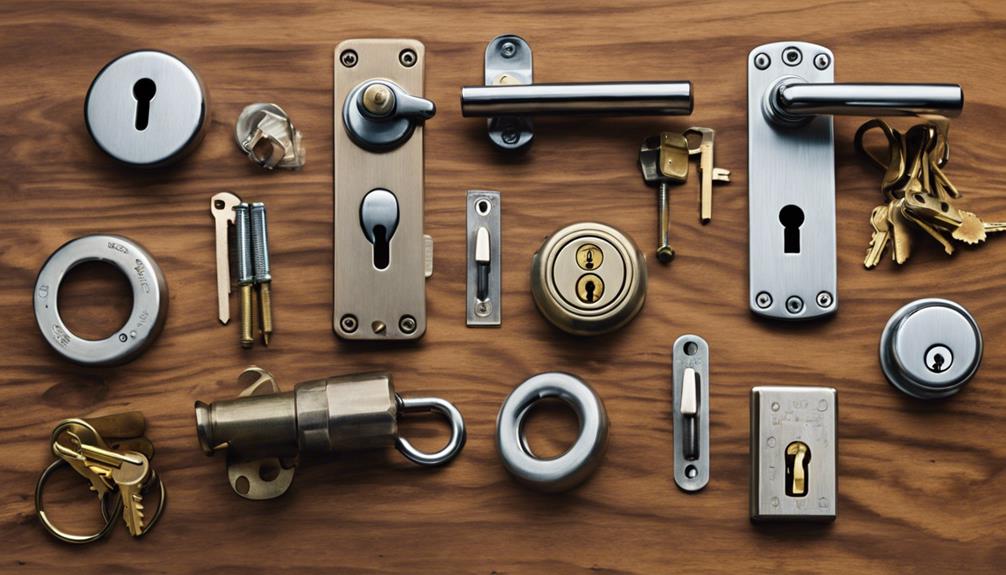
When considering deadbolt locks, it is important to understand the different types available to meet various security needs. Single-cylinder deadbolts utilize a key on one side, while double-cylinder deadbolts require keys on both sides. Additionally, keyless deadbolts, including electronic and smart variations, provide enhanced convenience and modern security features.
Single Cylinder
Single cylinder deadbolt locks, equipped with a key on one side and a thumb turn on the other, offer a practical and secure solution for residential entryways. These locks are renowned for their simplicity and robust security features, making them an ideal choice for homeowners seeking to fortify their properties. The key side enhances protection against unauthorized entry, guaranteeing peace of mind. Cost-effective and straightforward to install, single cylinder deadbolts are not only a smart investment but also versatile, available in various finishes and designs to match diverse door styles. This adaptability ensures that security does not compromise aesthetics, empowering homeowners to achieve both safety and style effortlessly.
Double Cylinder
Double cylinder deadbolt locks, requiring a key for operation on both sides, provide an elevated level of security especially suited for doors with glass panels. These locks are ideal for thwarting intruders who might break the glass to reach inside and manipulate the interior knob. By necessitating a key for both entry and exit, double cylinder deadbolts greatly enhance protection against unauthorized access. They are particularly recommended for doors near windows or glass panels, enhancing security in vulnerable areas. Commonly utilized in commercial settings and high-security residential properties, double cylinder deadbolts guarantee robust defense. However, it’s important to contemplate the potential safety risk in emergencies, as these locks can impede swift egress, necessitating careful planning and key accessibility.
Keyless Deadbolts
Keyless deadbolts offer a modern and secure alternative to traditional keyed entry systems, utilizing advanced technologies such as PIN codes and smartphone apps for access. These innovative locks provide homeowners with a seamless and convenient entry experience, eliminating the need for physical keys. Enhanced security measures integrated into keyless deadbolts guarantee superior protection against lock picking and bumping techniques, making them an ideal choice for those prioritizing robust home security. The user-friendly nature of these systems allows for effortless management and control, reinforcing the appeal to those who value cutting-edge solutions. As keyless deadbolts continue to gain popularity, they represent the epitome of contemporary home security, merging convenience with uncompromised safety.
How Deadbolt Locks Work

To understand how deadbolt locks work, it is essential to look at their internal mechanisms and the installation process. The internal mechanisms involve a solid metal bolt that extends into the door jamb, operated by a key or thumb turn. Proper installation is vital for ensuring the lock’s effectiveness in providing high security.
Internal Mechanisms
Understanding the internal mechanisms of deadbolt locks is essential to comprehending how these devices provide enhanced security for residential and commercial properties. A deadbolt lock operates by extending a solid metal bolt into the door jamb, greatly bolstering the door’s resistance to forced entry. The internal mechanism comprises several key components: the lock body, bolt, thumb knob, swivel, and cylinder. When a key or thumb knob is turned, the bolt extends or retracts, securing the door effectively. This intricate design guarantees that deadbolts offer superior security compared to standard latch locks. By grasping the workings of these internal components, one gains the insight necessary to make informed decisions in fortifying home security measures, thereby asserting control and protection over one’s domain.
Installation Process
Proper installation of a deadbolt lock is essential for maximizing its security benefits. Deadbolt locks function by extending a solid metal bolt into the door jamb, operated by a key or thumb turn. This robust mechanism offers superior protection against forced entry compared to standard latch locks. To install a deadbolt, begin by drilling precise holes and marking outlines on the door. Cut mortises to accommodate the lock’s components, ensuring a flush fit. Securely attach the mechanisms, including the bolt and strike plate, and test the lock for smooth operation. The meticulous installation process is vital in harnessing the deadbolt’s full potential, providing property owners with enhanced security and an unparalleled sense of control over their environment.
Advantages of Deadbolt Locks
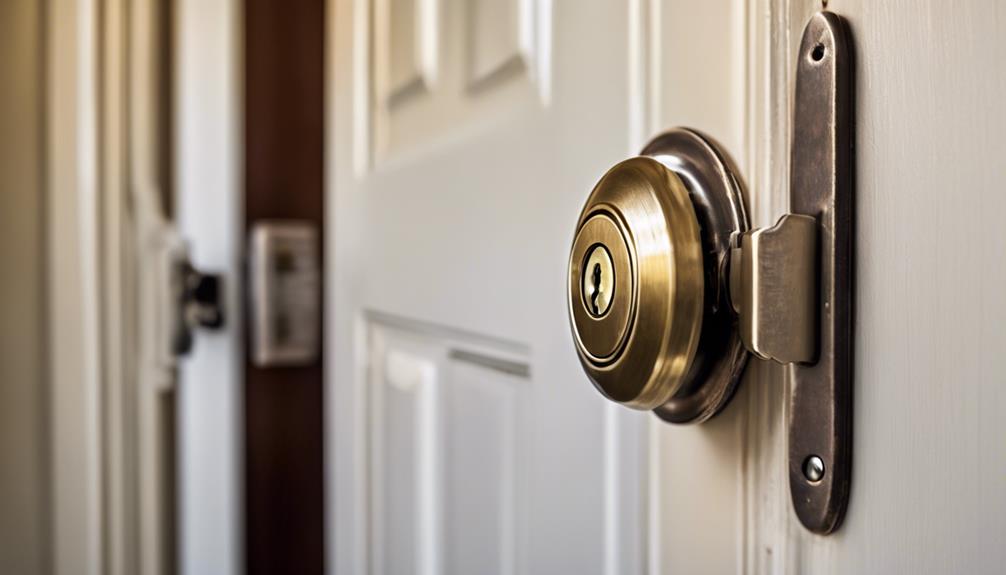
Deadbolt locks provide significant advantages in terms of security benefits and durability. These locks are specifically designed to resist forced entry and lock picking attempts, offering a robust layer of protection for your property. Additionally, their strong construction guarantees long-lasting performance, making them a reliable choice for enhanced home security.
Security Benefits
One of the foremost advantages of deadbolt locks is their superior resistance to forced entry compared to standard latch locks. Featuring a solid metal bolt, these locks are considerably more challenging for intruders to breach, therefore providing enhanced security. Deadbolt locks come in various forms, including single-cylinder, double-cylinder, electronic, and smart locks, allowing property owners to tailor their security measures to specific needs. Additionally, the cost-effectiveness and ease of installation make deadbolts an attractive choice for both residential and commercial properties. Opting for high-quality deadbolts equipped with anti-drill features and hardened steel further augments the security of one’s premises, ensuring robust protection and peace of mind for occupants.
Durability and Strength
Boasting superior durability and strength, deadbolt locks offer a formidable barrier against forced entry, greatly enhancing the security of residential and commercial properties. Unlike standard knob locks, the solid metal bolt of a deadbolt provides robust security, resisting tampering and brute force attacks. Highly recommended for preventing break-ins, deadbolt locks are engineered to greatly bolster the strength of entry points. Security grades further classify these locks, with Grade 1 deadbolts delivering the pinnacle of protection. By installing a Grade 1 deadbolt, homeowners can substantially fortify their defenses, deterring even the most determined intruders. Essentially, deadbolts stand as a proof of uncompromising security, making them an indispensable component of any powerful home security strategy.
Common Applications and Use Cases
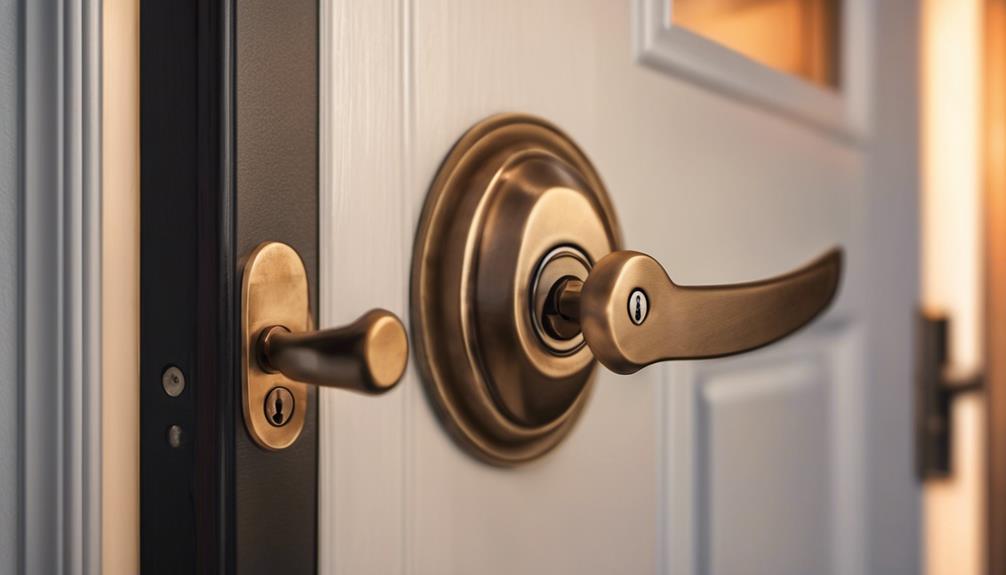
Deadbolt locks are widely utilized in both residential and commercial settings to enhance security against unauthorized access. Typically installed on front, back, and other exterior doors, they provide a formidable barrier to forced entry. When used in combination with other locking mechanisms, deadbolt locks offer superior protection for properties and their occupants.
Best Locations for Installation
Exterior doors of homes, apartments, and offices are among the most critical locations for installing deadbolt locks to ensure enhanced security. These robust locks are ideal for front doors, back doors, and garage entry doors—key points that require high-level protection. Additionally, deadbolts are advantageous for securing interior doors leading to home offices, safes, or rooms containing valuables, providing an extra layer of security. For properties with entry doors to basements, attics, sheds, or outbuildings, deadbolts serve as a formidable barrier against unauthorized access. Deadbolts are specifically designed to withstand forced entry attempts, making them essential in any security-conscious setting. By strategically installing deadbolts, homeowners and office managers can greatly strengthen their overall security posture.
Residential vs. Commercial Uses
In both residential and commercial settings, deadbolt locks play a critical role in enhancing security and preventing unauthorized access. Residential deadbolts are essential for homeowners seeking peace of mind, providing high security and deterring forced entry. They secure entry points, creating a formidable barrier against break-ins. Conversely, in commercial buildings, deadbolt locks are indispensable for safeguarding sensitive areas and valuable assets. They are particularly effective in protecting offices, storage rooms, and restricted zones from unauthorized personnel. Whether securing a family home or a thriving business, deadbolt locks offer a reliable and effective measure to guarantee robust protection. Their versatile application underscores their paramount importance in both residential and commercial security strategies.
Maintenance and Troubleshooting
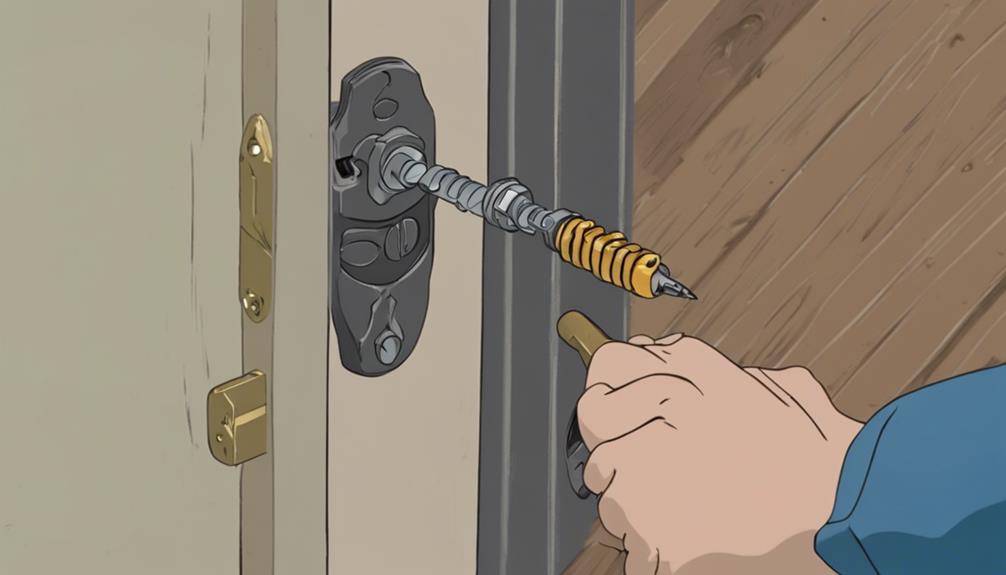
Maintaining the functionality and security of deadbolt locks requires regular care and attention. Routine tasks such as lubricating the bolt, hinges, and keyhole, as well as inspecting for wear and tear, can prevent common issues like key difficulty and misalignment. Addressing these problems promptly through simple adjustments or professional assistance guarantees the longevity and reliability of your deadbolt locks.
Regular Maintenance Tips
Regular maintenance of deadbolt locks is essential for ensuring their long-term functionality and security. To maintain peak performance, regularly lubricate the deadbolt with graphite or silicone spray, ensuring smooth operation. Periodically check the strike plate alignment for proper engagement with the deadbolt and test the lock to confirm it extends and retracts without obstruction. Tighten any loose screws on both the lock and strike plate to uphold the integrity of the door’s security. Additionally, inspect the lock for signs of wear or damage, such as rust or corrosion, and replace components if necessary. By adhering to these maintenance practices, you guarantee a formidable barrier against unauthorized access, reinforcing your home’s defense system.
Common Issues and Fixes
Deadbolt locks can sometimes face operational challenges due to common issues such as jamming, misalignment, and worn-out components. Jamming often results from dirt or debris within the mechanism. To resolve this, clean and lubricate the lock regularly. Misalignment issues can be fixed by adjusting the strike plate or checking key alignment. Loose screws should be tightened to maintain the lock’s integrity. Inspect worn-out parts and replace them promptly to guarantee top-notch security. For complex problems like broken parts or extensive damage, seeking professional assistance is advisable. Regular maintenance, including lubrication and thorough inspection, is essential for preventing these common issues and ensuring the consistent performance of deadbolt locks, thereby fortifying your home security.
Comparing Deadbolt Locks with Other Locks
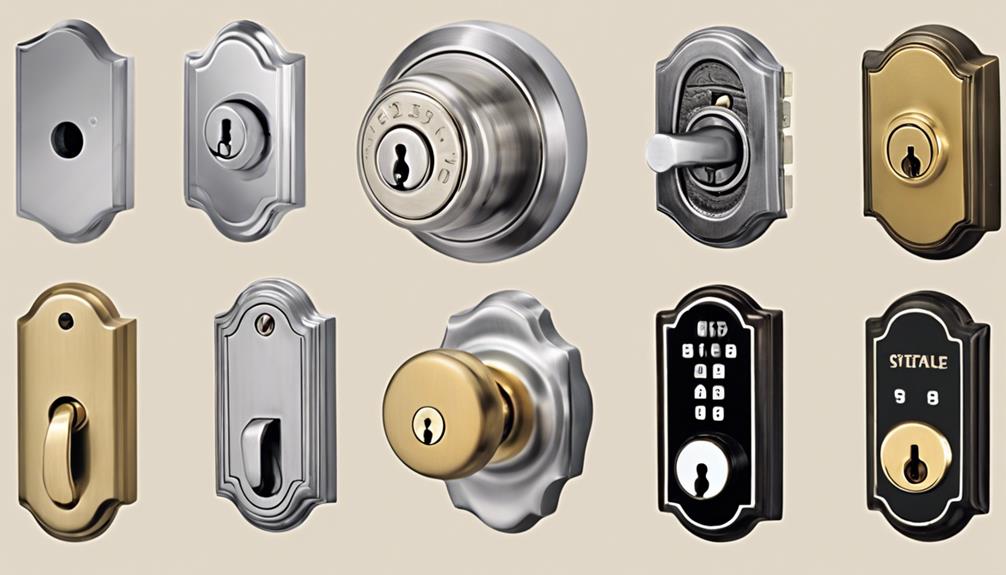
When evaluating the security and cost of deadbolt locks compared to other types, several factors come into play. Deadbolt locks generally offer superior security features, such as a solid metal bolt, which enhances resistance to forced entry. However, the added security often comes at a higher initial cost, making it essential for homeowners to weigh these considerations carefully.
Security Comparison
In the field of home security, deadbolt locks stand out by offering superior resistance to forced entry compared to knob locks, lever handle locks, and keyless entry systems. Constructed with solid metal bolts, deadbolt locks provide robust protection, greatly reducing the risk of unauthorized access. Knob and lever handle locks, despite their convenience, lack the structural integrity to withstand considerable force, making them less secure. While keyless entry systems offer technological convenience, they may fall short in terms of mechanical fortitude and reliability. For homeowners seeking robust security solutions, deadbolt locks are the preferred choice, particularly for front doors, where the need for maximum protection is paramount. Deadbolts exemplify the ultimate blend of strength and security.
Cost Comparison
Comparing the cost of various lock types reveals that deadbolt locks strike a balance between affordability and security. While knob locks are cheaper, they compromise on security, making them less ideal for those who prioritize safety. Lever handle locks, often more expensive due to their convenience and ADA compliance, might not offer the same level of protection as deadbolts. Keyless entry systems, with their advanced technology, command higher prices, potentially stretching budgets. For bulk purchases, deadbolt locks emerge as the most budget-friendly option, offering a cost-effective solution without sacrificing security. This makes them an attractive choice for both individual homeowners and large-scale property managers seeking robust protection without excessive expenditure.
Conclusion and Recommendations
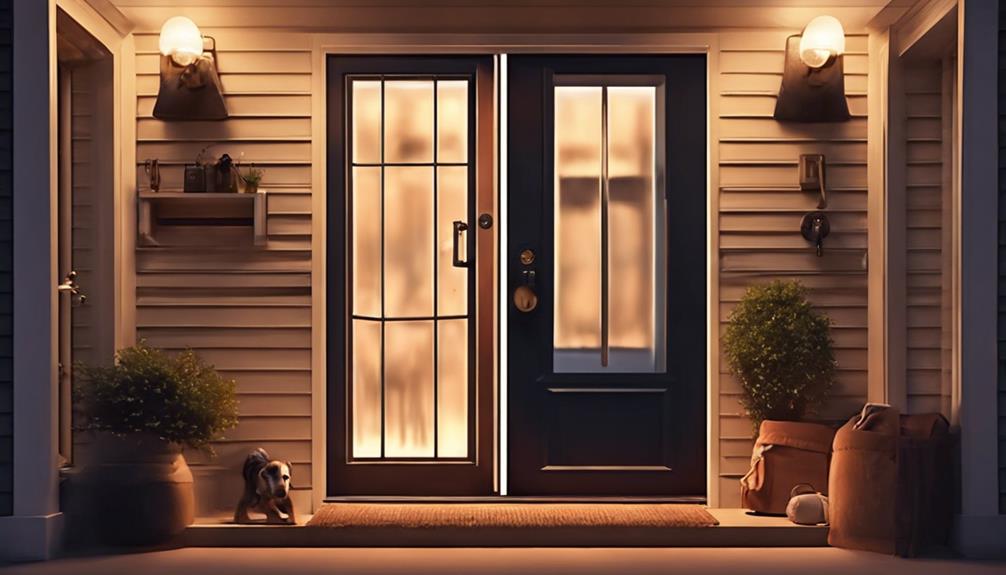
To guarantee top-notch home security, it is vital to invest in high-quality deadbolt locks, taking into account factors such as security grade, material quality, and ease of installation. Regular maintenance and timely replacements are essential to maintain their effectiveness. For further guidance, consult additional resources and seek professional advice to select and install the best deadbolt locks for your needs.
Best Practices for Choosing Deadbolt Locks
When choosing a deadbolt lock, prioritize models with high-security features such as anti-drill protection and hardened steel construction. Opt for locks with an ANSI/BHMA Grade 1 security rating, denoting the highest level of security. Evaluate advanced access options like keypad or fingerprint entry for enhanced convenience and protection. Assess whether you prefer DIY installation or professional installation, depending on your expertise and comfort level. Additionally, make sure the deadbolt comes with a robust warranty and reliable after-sales support. These best practices will empower you to make informed decisions, securing your home with uncompromising strength and reliability. Your commitment to high-security standards will pave the way for a fortified and resilient home.
Additional Resources and Links
For further enhancing your knowledge and ensuring the best use of your deadbolt locks, several valuable resources and links are available to guide you. Explore reputable locksmith websites for detailed guides on installation and maintenance. Manufacturer websites often provide video tutorials and FAQs, addressing features and troubleshooting. Engage in online forums and communities to discuss best practices and share experiences with fellow security enthusiasts. YouTube channels dedicated to home security offer visual demonstrations and expert insights, making complex concepts easier to grasp. Finally, visit hardware stores or home improvement centers for hands-on demonstrations and expert advice. By leveraging these resources, you will be well-equipped to maximize the security benefits of your deadbolt locks.
Frequently Asked Questions
Are Deadbolt Locks Resistant to Lockpicking Techniques?
Deadbolt locks symbolize the guardian standing resolutely at the gates of your sanctuary, embodying strength and security. Resistant to lockpicking techniques, these locks feature solid metal bolts and intricate mechanisms that thwart unauthorized access. High-quality deadbolts, especially those with ANSI/BHMA Grade 1 ratings, are fortified with anti-pick characteristics, making them formidable defenders against intrusion. Investing in a reputable brand guarantees unparalleled protection, reinforcing your dominion against potential threats.
Can Deadbolt Locks Be Installed on All Door Types?
Deadbolt locks can be installed on most standard doors such as wooden, metal, and fiberglass. However, they are not suitable for sliding doors, glass doors, or those with unconventional structures. Proper installation necessitates a solid door frame to guarantee maximum security. Additionally, some models offer adjustable backsets for varying door thicknesses. For best results and security, consulting a professional locksmith is highly recommended to guarantee proper functionality across different door types.
How Do Smart Deadbolts Integrate With Home Security Systems?
Smart deadbolts guarantee robust security, integrating seamlessly with home security systems to offer unparalleled control and monitoring. By connecting to these systems, they provide remote access through smartphone apps and can send real-time alerts about door activity and unauthorized access attempts. Integration with smart home assistants like Alexa or Google Assistant further enhances convenience, allowing voice command control. Advanced encryption guarantees robust security, protecting against hacking and unauthorized entry.
Are There Childproof Deadbolt Lock Options Available?
Yes, childproof deadbolt lock options are available. For instance, consider the hypothetical scenario of the Johnson family, who installed double-action childproof deadbolts. These locks require a key from both sides, ensuring their adventurous toddler cannot open the door. Such deadbolts not only prevent accidental exits but also offer parents unparalleled peace of mind, knowing their home is fortified against potential hazards.
What Materials Are Best for Durable Deadbolt Locks?
The most durable materials for deadbolt locks include hardened steel, brass, and nickel-plated brass. Hardened steel offers unparalleled strength and resistance to tampering. Brass is notable for its corrosion resistance, making it ideal for outdoor use. Nickel-plated brass combines both durability and aesthetic appeal. Opting for deadbolts made from these high-quality materials guarantees robust, long-lasting security for your home or property, catering to those who prioritize formidable protection.

